Issues in Harmonizing Domestic Standards with IFRS: A Report
VerifiedAdded on 2020/06/04
|16
|5299
|467
Report
AI Summary
This report investigates the challenges organizations face when harmonizing domestic accounting standards with International Financial Reporting Standards (IFRS). It begins by outlining the importance of financial information and the role of IFRS in providing standardized data for stakeholders, including investors and creditors. The study highlights the difficulties encountered when transitioning from domestic accounting practices to IFRS, such as increased disclosure requirements. The report further explores the rationale for the study, aiming to analyze the differences between international and domestic accounting standards, evaluate traditional accounting systems, and identify problems during the harmonization process. The literature review examines the significance of traditional accounting systems, differences between domestic and international standards, and the challenges of adopting IFRS. The report also discusses research methodology, including research approach and philosophy, data collection, and analysis methods. The conclusion and recommendations provide insights into improving the coordination between domestic and international accounting standards.
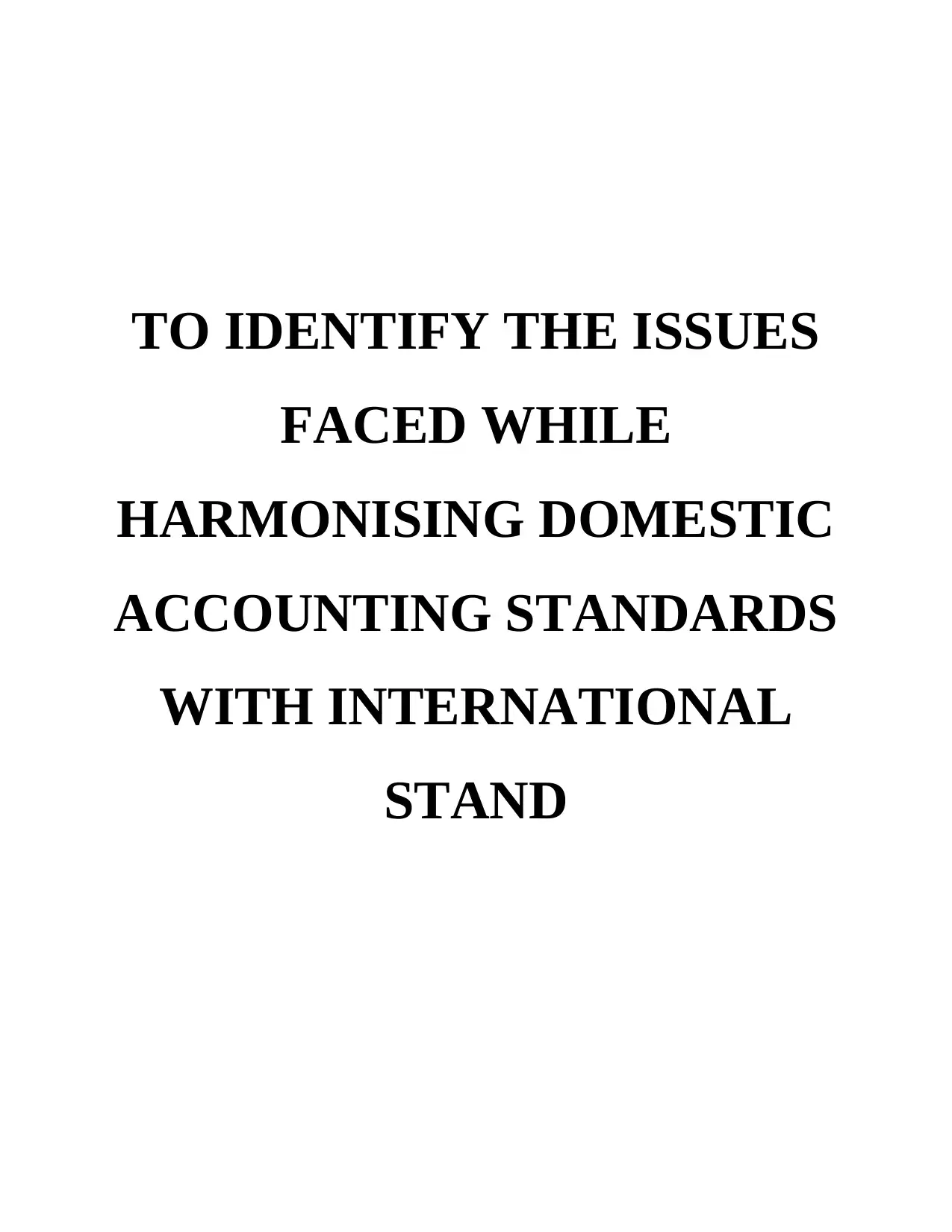
TO IDENTIFY THE ISSUES
FACED WHILE
HARMONISING DOMESTIC
ACCOUNTING STANDARDS
WITH INTERNATIONAL
STAND
FACED WHILE
HARMONISING DOMESTIC
ACCOUNTING STANDARDS
WITH INTERNATIONAL
STAND
Paraphrase This Document
Need a fresh take? Get an instant paraphrase of this document with our AI Paraphraser
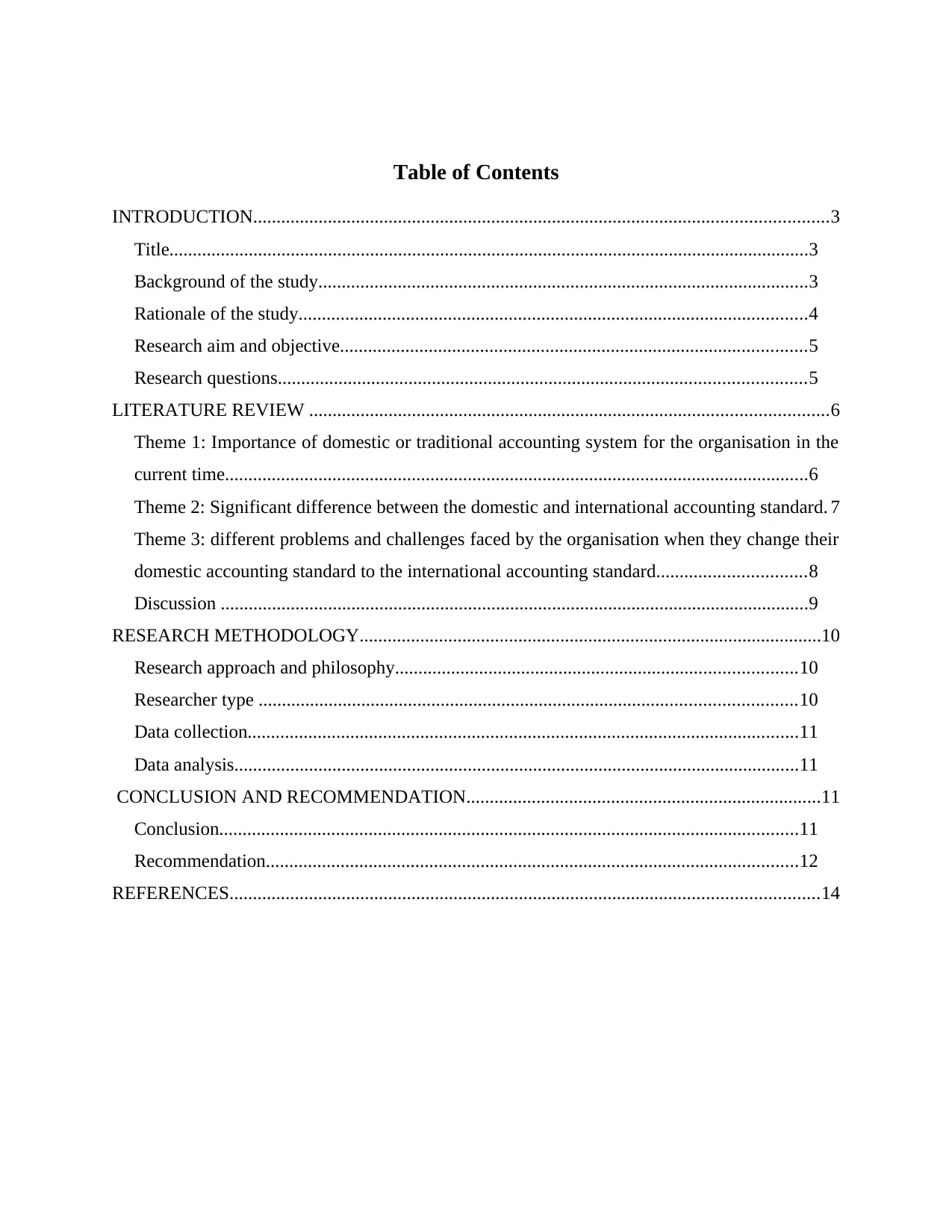
Table of Contents
INTRODUCTION...........................................................................................................................3
Title.........................................................................................................................................3
Background of the study.........................................................................................................3
Rationale of the study.............................................................................................................4
Research aim and objective....................................................................................................5
Research questions.................................................................................................................5
LITERATURE REVIEW ...............................................................................................................6
Theme 1: Importance of domestic or traditional accounting system for the organisation in the
current time.............................................................................................................................6
Theme 2: Significant difference between the domestic and international accounting standard. 7
Theme 3: different problems and challenges faced by the organisation when they change their
domestic accounting standard to the international accounting standard................................8
Discussion ..............................................................................................................................9
RESEARCH METHODOLOGY...................................................................................................10
Research approach and philosophy......................................................................................10
Researcher type ...................................................................................................................10
Data collection......................................................................................................................11
Data analysis.........................................................................................................................11
CONCLUSION AND RECOMMENDATION............................................................................11
Conclusion............................................................................................................................11
Recommendation..................................................................................................................12
REFERENCES..............................................................................................................................14
INTRODUCTION...........................................................................................................................3
Title.........................................................................................................................................3
Background of the study.........................................................................................................3
Rationale of the study.............................................................................................................4
Research aim and objective....................................................................................................5
Research questions.................................................................................................................5
LITERATURE REVIEW ...............................................................................................................6
Theme 1: Importance of domestic or traditional accounting system for the organisation in the
current time.............................................................................................................................6
Theme 2: Significant difference between the domestic and international accounting standard. 7
Theme 3: different problems and challenges faced by the organisation when they change their
domestic accounting standard to the international accounting standard................................8
Discussion ..............................................................................................................................9
RESEARCH METHODOLOGY...................................................................................................10
Research approach and philosophy......................................................................................10
Researcher type ...................................................................................................................10
Data collection......................................................................................................................11
Data analysis.........................................................................................................................11
CONCLUSION AND RECOMMENDATION............................................................................11
Conclusion............................................................................................................................11
Recommendation..................................................................................................................12
REFERENCES..............................................................................................................................14
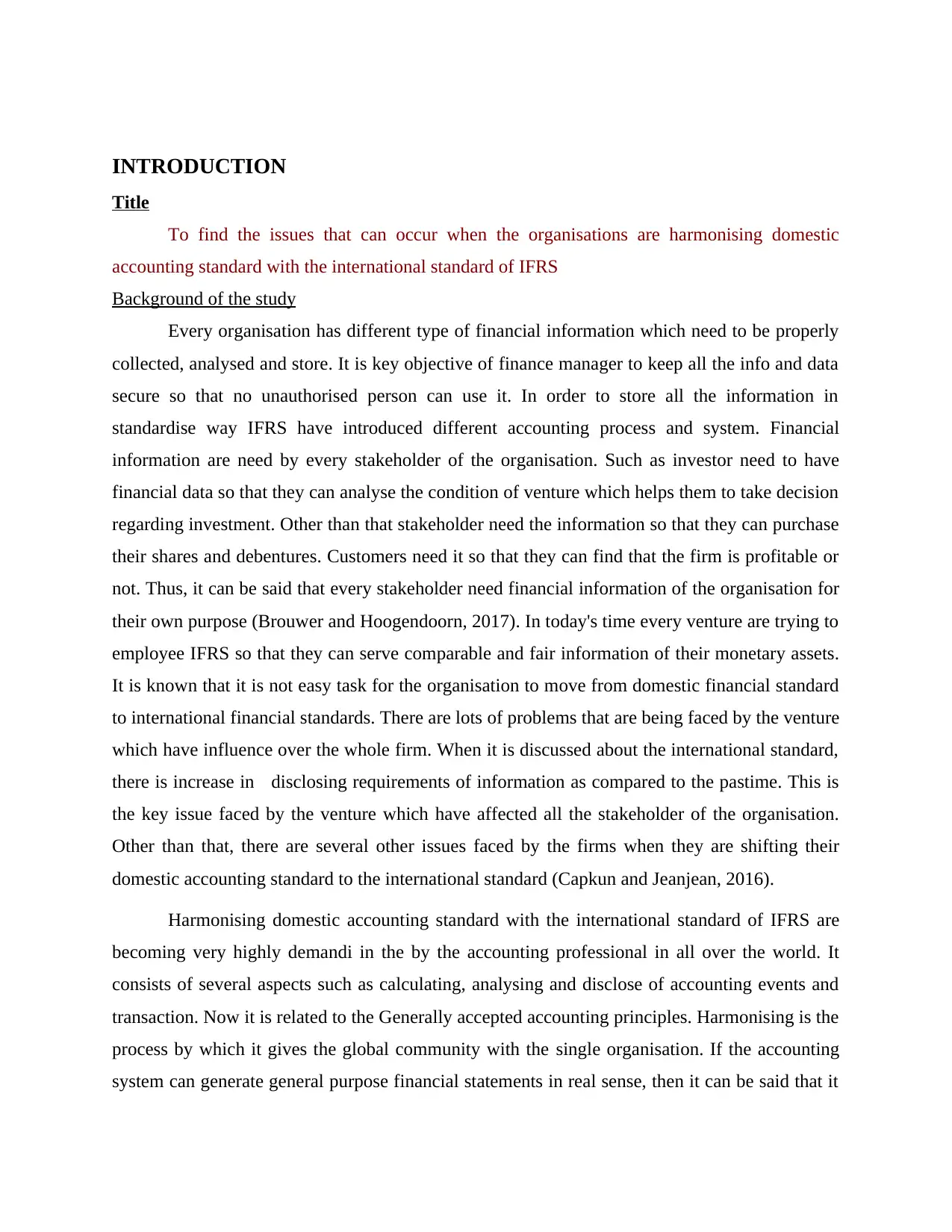
INTRODUCTION
Title
To find the issues that can occur when the organisations are harmonising domestic
accounting standard with the international standard of IFRS
Background of the study
Every organisation has different type of financial information which need to be properly
collected, analysed and store. It is key objective of finance manager to keep all the info and data
secure so that no unauthorised person can use it. In order to store all the information in
standardise way IFRS have introduced different accounting process and system. Financial
information are need by every stakeholder of the organisation. Such as investor need to have
financial data so that they can analyse the condition of venture which helps them to take decision
regarding investment. Other than that stakeholder need the information so that they can purchase
their shares and debentures. Customers need it so that they can find that the firm is profitable or
not. Thus, it can be said that every stakeholder need financial information of the organisation for
their own purpose (Brouwer and Hoogendoorn, 2017). In today's time every venture are trying to
employee IFRS so that they can serve comparable and fair information of their monetary assets.
It is known that it is not easy task for the organisation to move from domestic financial standard
to international financial standards. There are lots of problems that are being faced by the venture
which have influence over the whole firm. When it is discussed about the international standard,
there is increase in disclosing requirements of information as compared to the pastime. This is
the key issue faced by the venture which have affected all the stakeholder of the organisation.
Other than that, there are several other issues faced by the firms when they are shifting their
domestic accounting standard to the international standard (Capkun and Jeanjean, 2016).
Harmonising domestic accounting standard with the international standard of IFRS are
becoming very highly demandi in the by the accounting professional in all over the world. It
consists of several aspects such as calculating, analysing and disclose of accounting events and
transaction. Now it is related to the Generally accepted accounting principles. Harmonising is the
process by which it gives the global community with the single organisation. If the accounting
system can generate general purpose financial statements in real sense, then it can be said that it
Title
To find the issues that can occur when the organisations are harmonising domestic
accounting standard with the international standard of IFRS
Background of the study
Every organisation has different type of financial information which need to be properly
collected, analysed and store. It is key objective of finance manager to keep all the info and data
secure so that no unauthorised person can use it. In order to store all the information in
standardise way IFRS have introduced different accounting process and system. Financial
information are need by every stakeholder of the organisation. Such as investor need to have
financial data so that they can analyse the condition of venture which helps them to take decision
regarding investment. Other than that stakeholder need the information so that they can purchase
their shares and debentures. Customers need it so that they can find that the firm is profitable or
not. Thus, it can be said that every stakeholder need financial information of the organisation for
their own purpose (Brouwer and Hoogendoorn, 2017). In today's time every venture are trying to
employee IFRS so that they can serve comparable and fair information of their monetary assets.
It is known that it is not easy task for the organisation to move from domestic financial standard
to international financial standards. There are lots of problems that are being faced by the venture
which have influence over the whole firm. When it is discussed about the international standard,
there is increase in disclosing requirements of information as compared to the pastime. This is
the key issue faced by the venture which have affected all the stakeholder of the organisation.
Other than that, there are several other issues faced by the firms when they are shifting their
domestic accounting standard to the international standard (Capkun and Jeanjean, 2016).
Harmonising domestic accounting standard with the international standard of IFRS are
becoming very highly demandi in the by the accounting professional in all over the world. It
consists of several aspects such as calculating, analysing and disclose of accounting events and
transaction. Now it is related to the Generally accepted accounting principles. Harmonising is the
process by which it gives the global community with the single organisation. If the accounting
system can generate general purpose financial statements in real sense, then it can be said that it
⊘ This is a preview!⊘
Do you want full access?
Subscribe today to unlock all pages.

Trusted by 1+ million students worldwide
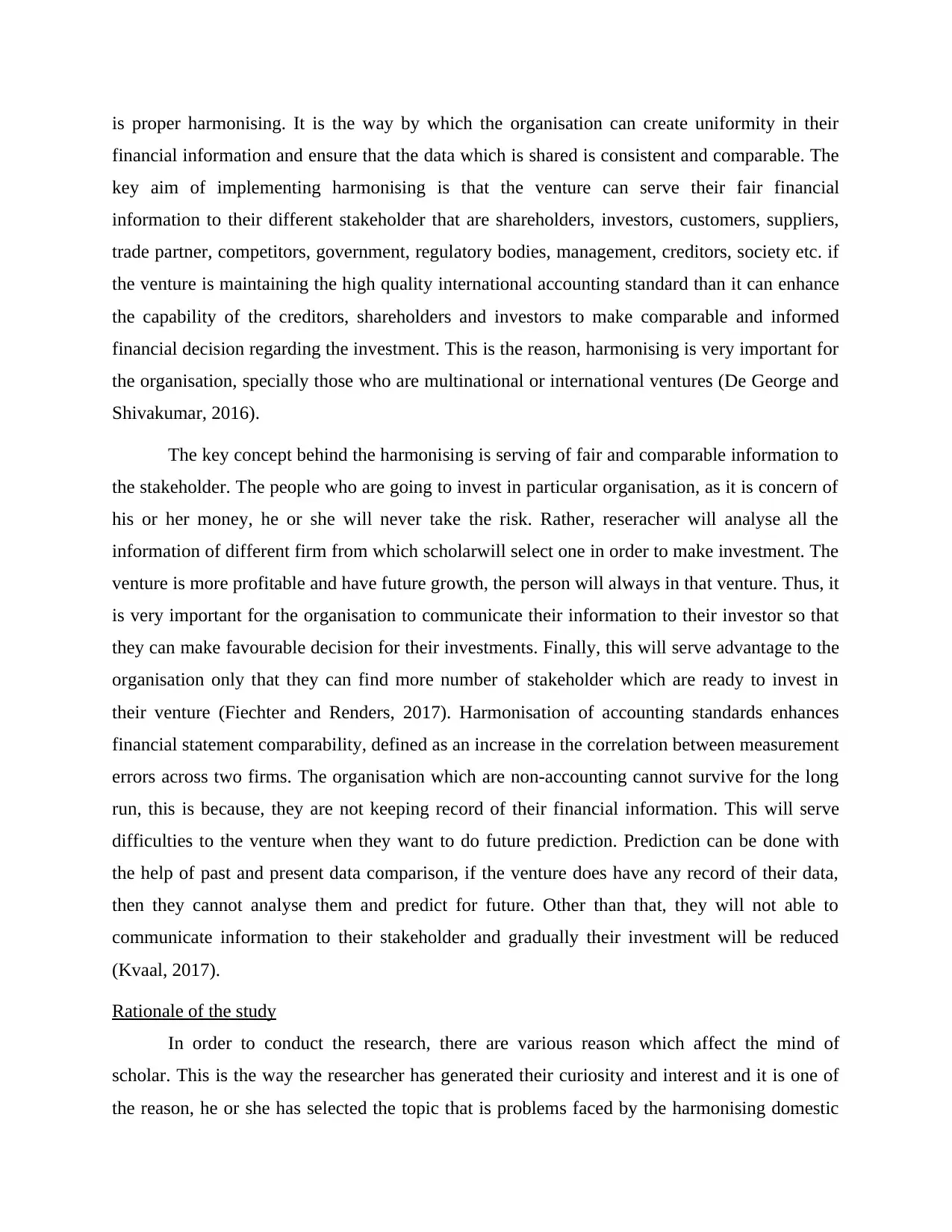
is proper harmonising. It is the way by which the organisation can create uniformity in their
financial information and ensure that the data which is shared is consistent and comparable. The
key aim of implementing harmonising is that the venture can serve their fair financial
information to their different stakeholder that are shareholders, investors, customers, suppliers,
trade partner, competitors, government, regulatory bodies, management, creditors, society etc. if
the venture is maintaining the high quality international accounting standard than it can enhance
the capability of the creditors, shareholders and investors to make comparable and informed
financial decision regarding the investment. This is the reason, harmonising is very important for
the organisation, specially those who are multinational or international ventures (De George and
Shivakumar, 2016).
The key concept behind the harmonising is serving of fair and comparable information to
the stakeholder. The people who are going to invest in particular organisation, as it is concern of
his or her money, he or she will never take the risk. Rather, reseracher will analyse all the
information of different firm from which scholarwill select one in order to make investment. The
venture is more profitable and have future growth, the person will always in that venture. Thus, it
is very important for the organisation to communicate their information to their investor so that
they can make favourable decision for their investments. Finally, this will serve advantage to the
organisation only that they can find more number of stakeholder which are ready to invest in
their venture (Fiechter and Renders, 2017). Harmonisation of accounting standards enhances
financial statement comparability, defined as an increase in the correlation between measurement
errors across two firms. The organisation which are non-accounting cannot survive for the long
run, this is because, they are not keeping record of their financial information. This will serve
difficulties to the venture when they want to do future prediction. Prediction can be done with
the help of past and present data comparison, if the venture does have any record of their data,
then they cannot analyse them and predict for future. Other than that, they will not able to
communicate information to their stakeholder and gradually their investment will be reduced
(Kvaal, 2017).
Rationale of the study
In order to conduct the research, there are various reason which affect the mind of
scholar. This is the way the researcher has generated their curiosity and interest and it is one of
the reason, he or she has selected the topic that is problems faced by the harmonising domestic
financial information and ensure that the data which is shared is consistent and comparable. The
key aim of implementing harmonising is that the venture can serve their fair financial
information to their different stakeholder that are shareholders, investors, customers, suppliers,
trade partner, competitors, government, regulatory bodies, management, creditors, society etc. if
the venture is maintaining the high quality international accounting standard than it can enhance
the capability of the creditors, shareholders and investors to make comparable and informed
financial decision regarding the investment. This is the reason, harmonising is very important for
the organisation, specially those who are multinational or international ventures (De George and
Shivakumar, 2016).
The key concept behind the harmonising is serving of fair and comparable information to
the stakeholder. The people who are going to invest in particular organisation, as it is concern of
his or her money, he or she will never take the risk. Rather, reseracher will analyse all the
information of different firm from which scholarwill select one in order to make investment. The
venture is more profitable and have future growth, the person will always in that venture. Thus, it
is very important for the organisation to communicate their information to their investor so that
they can make favourable decision for their investments. Finally, this will serve advantage to the
organisation only that they can find more number of stakeholder which are ready to invest in
their venture (Fiechter and Renders, 2017). Harmonisation of accounting standards enhances
financial statement comparability, defined as an increase in the correlation between measurement
errors across two firms. The organisation which are non-accounting cannot survive for the long
run, this is because, they are not keeping record of their financial information. This will serve
difficulties to the venture when they want to do future prediction. Prediction can be done with
the help of past and present data comparison, if the venture does have any record of their data,
then they cannot analyse them and predict for future. Other than that, they will not able to
communicate information to their stakeholder and gradually their investment will be reduced
(Kvaal, 2017).
Rationale of the study
In order to conduct the research, there are various reason which affect the mind of
scholar. This is the way the researcher has generated their curiosity and interest and it is one of
the reason, he or she has selected the topic that is problems faced by the harmonising domestic
Paraphrase This Document
Need a fresh take? Get an instant paraphrase of this document with our AI Paraphraser
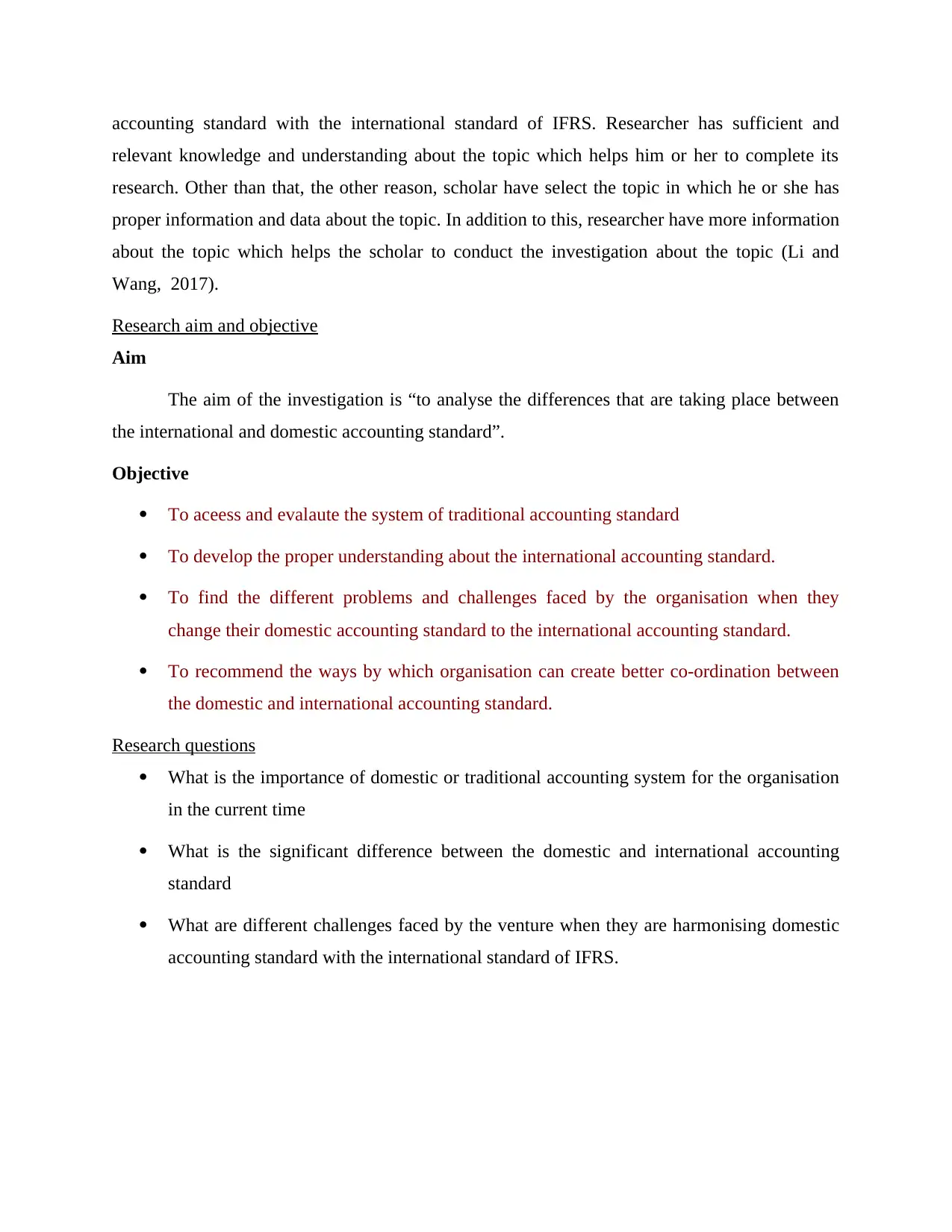
accounting standard with the international standard of IFRS. Researcher has sufficient and
relevant knowledge and understanding about the topic which helps him or her to complete its
research. Other than that, the other reason, scholar have select the topic in which he or she has
proper information and data about the topic. In addition to this, researcher have more information
about the topic which helps the scholar to conduct the investigation about the topic (Li and
Wang, 2017).
Research aim and objective
Aim
The aim of the investigation is “to analyse the differences that are taking place between
the international and domestic accounting standard”.
Objective
To aceess and evalaute the system of traditional accounting standard
To develop the proper understanding about the international accounting standard.
To find the different problems and challenges faced by the organisation when they
change their domestic accounting standard to the international accounting standard.
To recommend the ways by which organisation can create better co-ordination between
the domestic and international accounting standard.
Research questions
What is the importance of domestic or traditional accounting system for the organisation
in the current time
What is the significant difference between the domestic and international accounting
standard
What are different challenges faced by the venture when they are harmonising domestic
accounting standard with the international standard of IFRS.
relevant knowledge and understanding about the topic which helps him or her to complete its
research. Other than that, the other reason, scholar have select the topic in which he or she has
proper information and data about the topic. In addition to this, researcher have more information
about the topic which helps the scholar to conduct the investigation about the topic (Li and
Wang, 2017).
Research aim and objective
Aim
The aim of the investigation is “to analyse the differences that are taking place between
the international and domestic accounting standard”.
Objective
To aceess and evalaute the system of traditional accounting standard
To develop the proper understanding about the international accounting standard.
To find the different problems and challenges faced by the organisation when they
change their domestic accounting standard to the international accounting standard.
To recommend the ways by which organisation can create better co-ordination between
the domestic and international accounting standard.
Research questions
What is the importance of domestic or traditional accounting system for the organisation
in the current time
What is the significant difference between the domestic and international accounting
standard
What are different challenges faced by the venture when they are harmonising domestic
accounting standard with the international standard of IFRS.
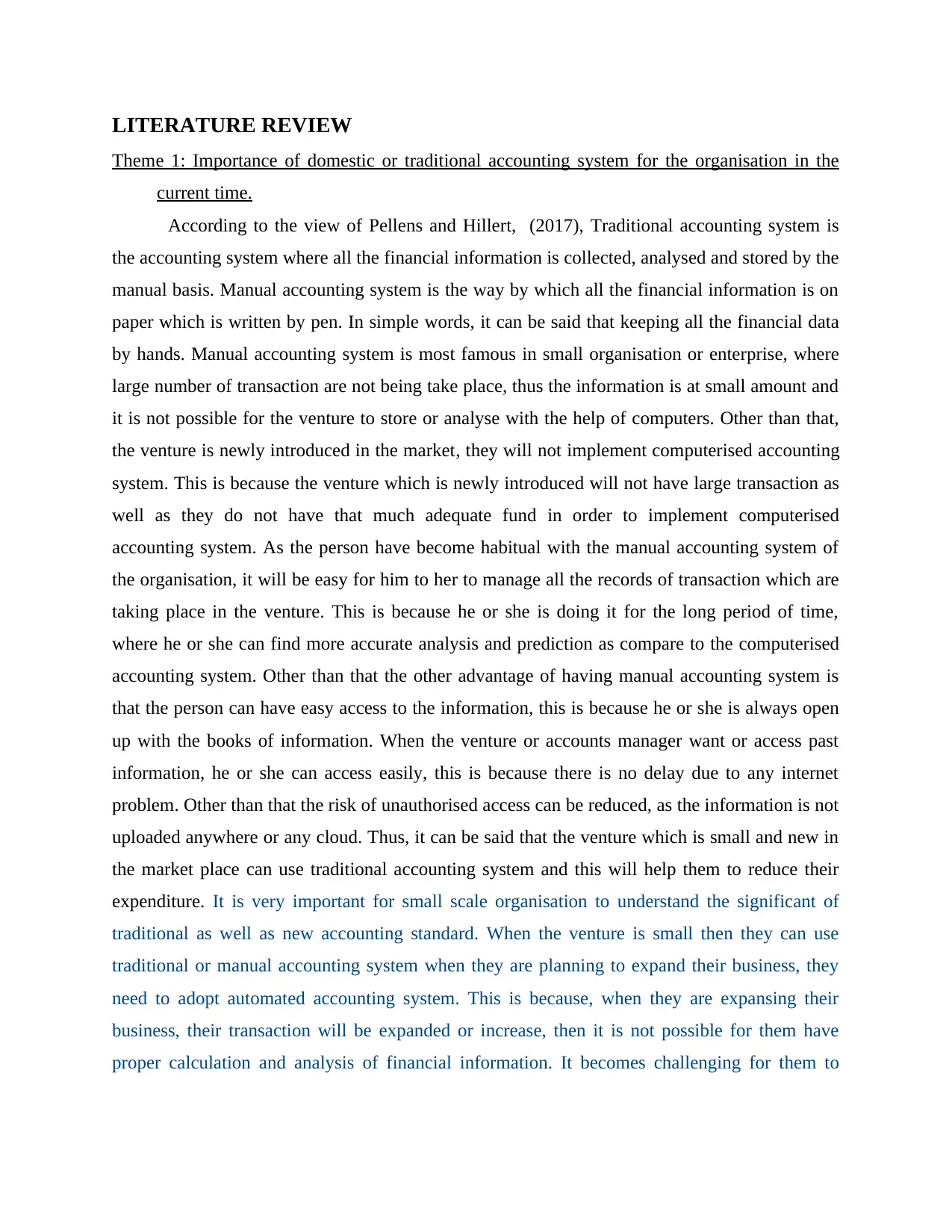
LITERATURE REVIEW
Theme 1: Importance of domestic or traditional accounting system for the organisation in the
current time.
According to the view of Pellens and Hillert, (2017), Traditional accounting system is
the accounting system where all the financial information is collected, analysed and stored by the
manual basis. Manual accounting system is the way by which all the financial information is on
paper which is written by pen. In simple words, it can be said that keeping all the financial data
by hands. Manual accounting system is most famous in small organisation or enterprise, where
large number of transaction are not being take place, thus the information is at small amount and
it is not possible for the venture to store or analyse with the help of computers. Other than that,
the venture is newly introduced in the market, they will not implement computerised accounting
system. This is because the venture which is newly introduced will not have large transaction as
well as they do not have that much adequate fund in order to implement computerised
accounting system. As the person have become habitual with the manual accounting system of
the organisation, it will be easy for him to her to manage all the records of transaction which are
taking place in the venture. This is because he or she is doing it for the long period of time,
where he or she can find more accurate analysis and prediction as compare to the computerised
accounting system. Other than that the other advantage of having manual accounting system is
that the person can have easy access to the information, this is because he or she is always open
up with the books of information. When the venture or accounts manager want or access past
information, he or she can access easily, this is because there is no delay due to any internet
problem. Other than that the risk of unauthorised access can be reduced, as the information is not
uploaded anywhere or any cloud. Thus, it can be said that the venture which is small and new in
the market place can use traditional accounting system and this will help them to reduce their
expenditure. It is very important for small scale organisation to understand the significant of
traditional as well as new accounting standard. When the venture is small then they can use
traditional or manual accounting system when they are planning to expand their business, they
need to adopt automated accounting system. This is because, when they are expansing their
business, their transaction will be expanded or increase, then it is not possible for them have
proper calculation and analysis of financial information. It becomes challenging for them to
Theme 1: Importance of domestic or traditional accounting system for the organisation in the
current time.
According to the view of Pellens and Hillert, (2017), Traditional accounting system is
the accounting system where all the financial information is collected, analysed and stored by the
manual basis. Manual accounting system is the way by which all the financial information is on
paper which is written by pen. In simple words, it can be said that keeping all the financial data
by hands. Manual accounting system is most famous in small organisation or enterprise, where
large number of transaction are not being take place, thus the information is at small amount and
it is not possible for the venture to store or analyse with the help of computers. Other than that,
the venture is newly introduced in the market, they will not implement computerised accounting
system. This is because the venture which is newly introduced will not have large transaction as
well as they do not have that much adequate fund in order to implement computerised
accounting system. As the person have become habitual with the manual accounting system of
the organisation, it will be easy for him to her to manage all the records of transaction which are
taking place in the venture. This is because he or she is doing it for the long period of time,
where he or she can find more accurate analysis and prediction as compare to the computerised
accounting system. Other than that the other advantage of having manual accounting system is
that the person can have easy access to the information, this is because he or she is always open
up with the books of information. When the venture or accounts manager want or access past
information, he or she can access easily, this is because there is no delay due to any internet
problem. Other than that the risk of unauthorised access can be reduced, as the information is not
uploaded anywhere or any cloud. Thus, it can be said that the venture which is small and new in
the market place can use traditional accounting system and this will help them to reduce their
expenditure. It is very important for small scale organisation to understand the significant of
traditional as well as new accounting standard. When the venture is small then they can use
traditional or manual accounting system when they are planning to expand their business, they
need to adopt automated accounting system. This is because, when they are expansing their
business, their transaction will be expanded or increase, then it is not possible for them have
proper calculation and analysis of financial information. It becomes challenging for them to
⊘ This is a preview!⊘
Do you want full access?
Subscribe today to unlock all pages.

Trusted by 1+ million students worldwide
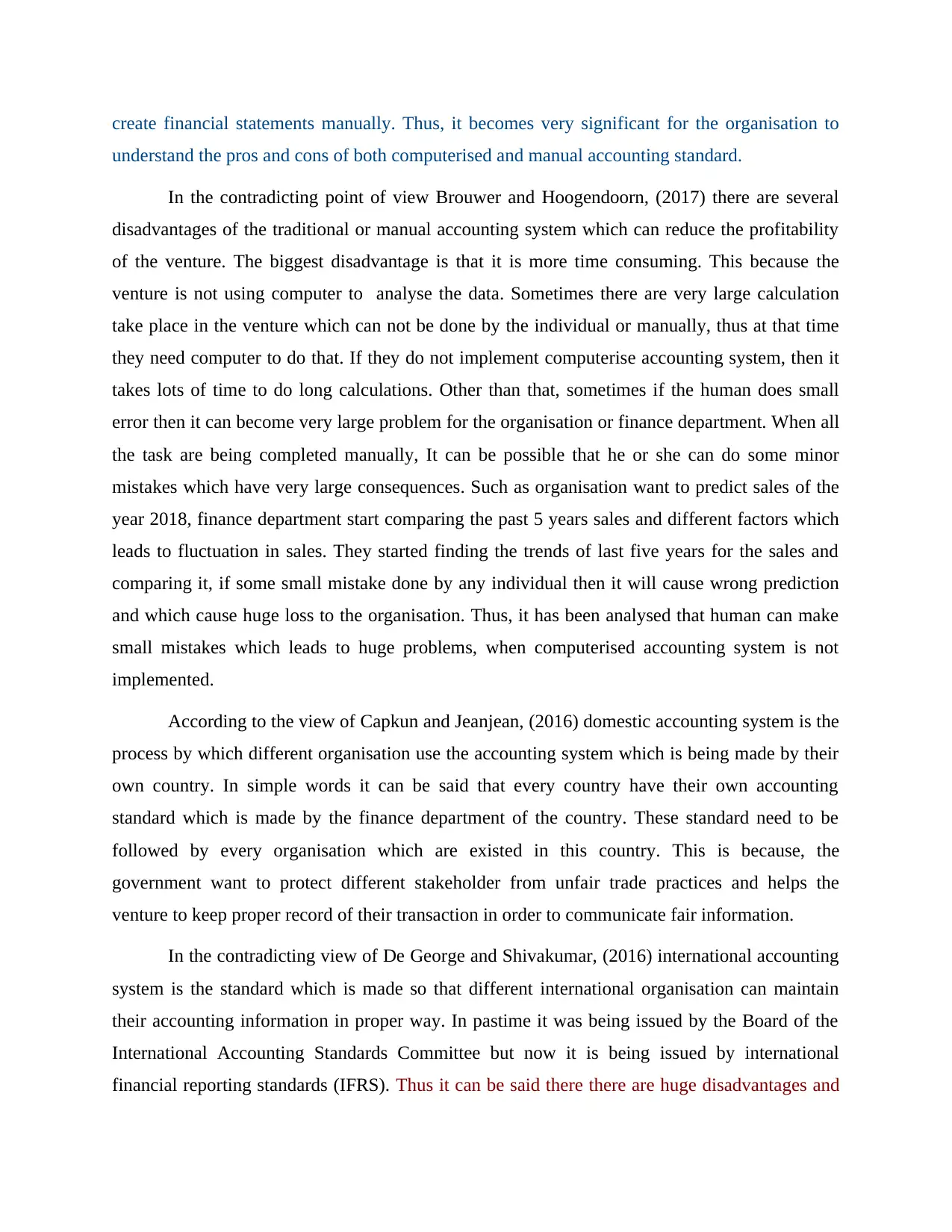
create financial statements manually. Thus, it becomes very significant for the organisation to
understand the pros and cons of both computerised and manual accounting standard.
In the contradicting point of view Brouwer and Hoogendoorn, (2017) there are several
disadvantages of the traditional or manual accounting system which can reduce the profitability
of the venture. The biggest disadvantage is that it is more time consuming. This because the
venture is not using computer to analyse the data. Sometimes there are very large calculation
take place in the venture which can not be done by the individual or manually, thus at that time
they need computer to do that. If they do not implement computerise accounting system, then it
takes lots of time to do long calculations. Other than that, sometimes if the human does small
error then it can become very large problem for the organisation or finance department. When all
the task are being completed manually, It can be possible that he or she can do some minor
mistakes which have very large consequences. Such as organisation want to predict sales of the
year 2018, finance department start comparing the past 5 years sales and different factors which
leads to fluctuation in sales. They started finding the trends of last five years for the sales and
comparing it, if some small mistake done by any individual then it will cause wrong prediction
and which cause huge loss to the organisation. Thus, it has been analysed that human can make
small mistakes which leads to huge problems, when computerised accounting system is not
implemented.
According to the view of Capkun and Jeanjean, (2016) domestic accounting system is the
process by which different organisation use the accounting system which is being made by their
own country. In simple words it can be said that every country have their own accounting
standard which is made by the finance department of the country. These standard need to be
followed by every organisation which are existed in this country. This is because, the
government want to protect different stakeholder from unfair trade practices and helps the
venture to keep proper record of their transaction in order to communicate fair information.
In the contradicting view of De George and Shivakumar, (2016) international accounting
system is the standard which is made so that different international organisation can maintain
their accounting information in proper way. In pastime it was being issued by the Board of the
International Accounting Standards Committee but now it is being issued by international
financial reporting standards (IFRS). Thus it can be said there there are huge disadvantages and
understand the pros and cons of both computerised and manual accounting standard.
In the contradicting point of view Brouwer and Hoogendoorn, (2017) there are several
disadvantages of the traditional or manual accounting system which can reduce the profitability
of the venture. The biggest disadvantage is that it is more time consuming. This because the
venture is not using computer to analyse the data. Sometimes there are very large calculation
take place in the venture which can not be done by the individual or manually, thus at that time
they need computer to do that. If they do not implement computerise accounting system, then it
takes lots of time to do long calculations. Other than that, sometimes if the human does small
error then it can become very large problem for the organisation or finance department. When all
the task are being completed manually, It can be possible that he or she can do some minor
mistakes which have very large consequences. Such as organisation want to predict sales of the
year 2018, finance department start comparing the past 5 years sales and different factors which
leads to fluctuation in sales. They started finding the trends of last five years for the sales and
comparing it, if some small mistake done by any individual then it will cause wrong prediction
and which cause huge loss to the organisation. Thus, it has been analysed that human can make
small mistakes which leads to huge problems, when computerised accounting system is not
implemented.
According to the view of Capkun and Jeanjean, (2016) domestic accounting system is the
process by which different organisation use the accounting system which is being made by their
own country. In simple words it can be said that every country have their own accounting
standard which is made by the finance department of the country. These standard need to be
followed by every organisation which are existed in this country. This is because, the
government want to protect different stakeholder from unfair trade practices and helps the
venture to keep proper record of their transaction in order to communicate fair information.
In the contradicting view of De George and Shivakumar, (2016) international accounting
system is the standard which is made so that different international organisation can maintain
their accounting information in proper way. In pastime it was being issued by the Board of the
International Accounting Standards Committee but now it is being issued by international
financial reporting standards (IFRS). Thus it can be said there there are huge disadvantages and
Paraphrase This Document
Need a fresh take? Get an instant paraphrase of this document with our AI Paraphraser
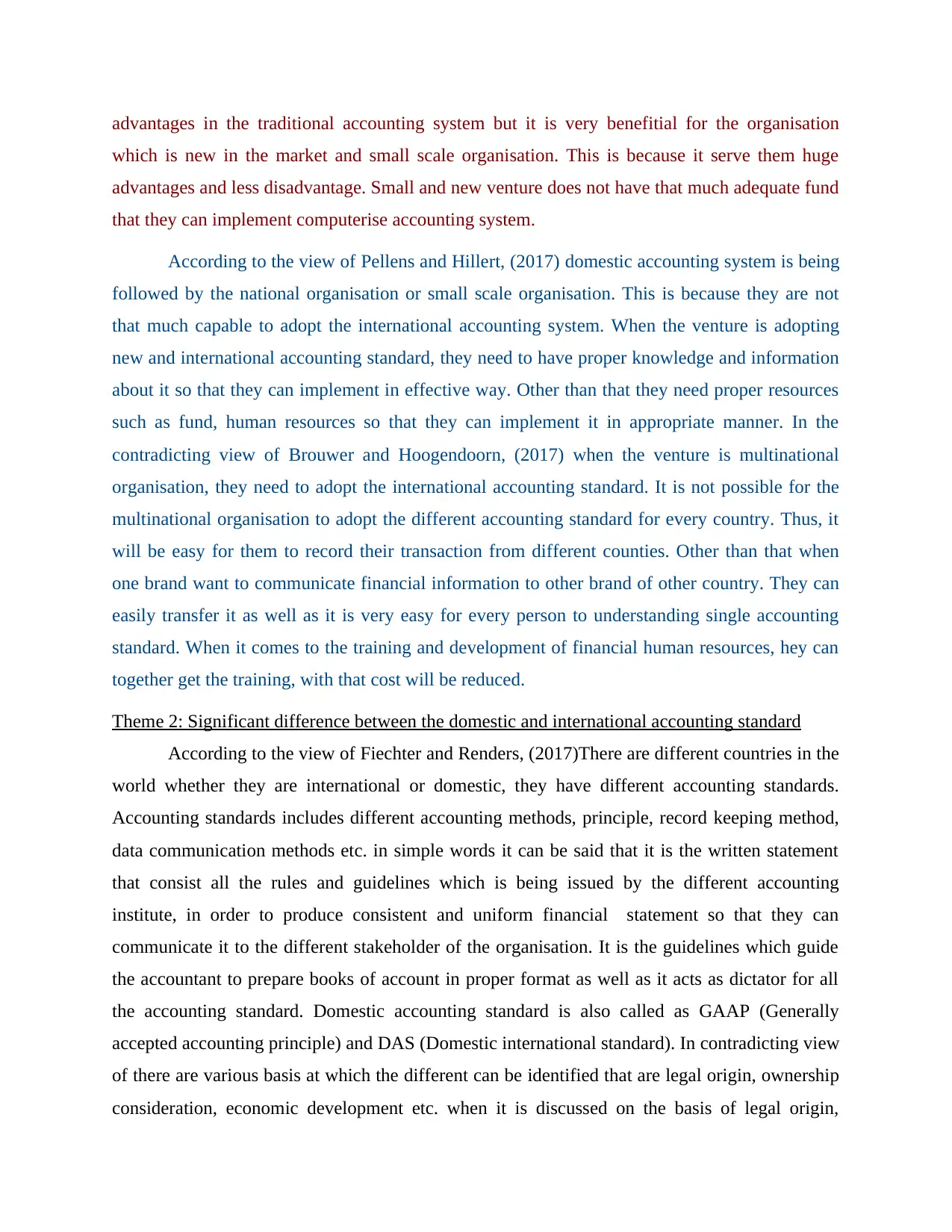
advantages in the traditional accounting system but it is very benefitial for the organisation
which is new in the market and small scale organisation. This is because it serve them huge
advantages and less disadvantage. Small and new venture does not have that much adequate fund
that they can implement computerise accounting system.
According to the view of Pellens and Hillert, (2017) domestic accounting system is being
followed by the national organisation or small scale organisation. This is because they are not
that much capable to adopt the international accounting system. When the venture is adopting
new and international accounting standard, they need to have proper knowledge and information
about it so that they can implement in effective way. Other than that they need proper resources
such as fund, human resources so that they can implement it in appropriate manner. In the
contradicting view of Brouwer and Hoogendoorn, (2017) when the venture is multinational
organisation, they need to adopt the international accounting standard. It is not possible for the
multinational organisation to adopt the different accounting standard for every country. Thus, it
will be easy for them to record their transaction from different counties. Other than that when
one brand want to communicate financial information to other brand of other country. They can
easily transfer it as well as it is very easy for every person to understanding single accounting
standard. When it comes to the training and development of financial human resources, hey can
together get the training, with that cost will be reduced.
Theme 2: Significant difference between the domestic and international accounting standard
According to the view of Fiechter and Renders, (2017)There are different countries in the
world whether they are international or domestic, they have different accounting standards.
Accounting standards includes different accounting methods, principle, record keeping method,
data communication methods etc. in simple words it can be said that it is the written statement
that consist all the rules and guidelines which is being issued by the different accounting
institute, in order to produce consistent and uniform financial statement so that they can
communicate it to the different stakeholder of the organisation. It is the guidelines which guide
the accountant to prepare books of account in proper format as well as it acts as dictator for all
the accounting standard. Domestic accounting standard is also called as GAAP (Generally
accepted accounting principle) and DAS (Domestic international standard). In contradicting view
of there are various basis at which the different can be identified that are legal origin, ownership
consideration, economic development etc. when it is discussed on the basis of legal origin,
which is new in the market and small scale organisation. This is because it serve them huge
advantages and less disadvantage. Small and new venture does not have that much adequate fund
that they can implement computerise accounting system.
According to the view of Pellens and Hillert, (2017) domestic accounting system is being
followed by the national organisation or small scale organisation. This is because they are not
that much capable to adopt the international accounting system. When the venture is adopting
new and international accounting standard, they need to have proper knowledge and information
about it so that they can implement in effective way. Other than that they need proper resources
such as fund, human resources so that they can implement it in appropriate manner. In the
contradicting view of Brouwer and Hoogendoorn, (2017) when the venture is multinational
organisation, they need to adopt the international accounting standard. It is not possible for the
multinational organisation to adopt the different accounting standard for every country. Thus, it
will be easy for them to record their transaction from different counties. Other than that when
one brand want to communicate financial information to other brand of other country. They can
easily transfer it as well as it is very easy for every person to understanding single accounting
standard. When it comes to the training and development of financial human resources, hey can
together get the training, with that cost will be reduced.
Theme 2: Significant difference between the domestic and international accounting standard
According to the view of Fiechter and Renders, (2017)There are different countries in the
world whether they are international or domestic, they have different accounting standards.
Accounting standards includes different accounting methods, principle, record keeping method,
data communication methods etc. in simple words it can be said that it is the written statement
that consist all the rules and guidelines which is being issued by the different accounting
institute, in order to produce consistent and uniform financial statement so that they can
communicate it to the different stakeholder of the organisation. It is the guidelines which guide
the accountant to prepare books of account in proper format as well as it acts as dictator for all
the accounting standard. Domestic accounting standard is also called as GAAP (Generally
accepted accounting principle) and DAS (Domestic international standard). In contradicting view
of there are various basis at which the different can be identified that are legal origin, ownership
consideration, economic development etc. when it is discussed on the basis of legal origin,
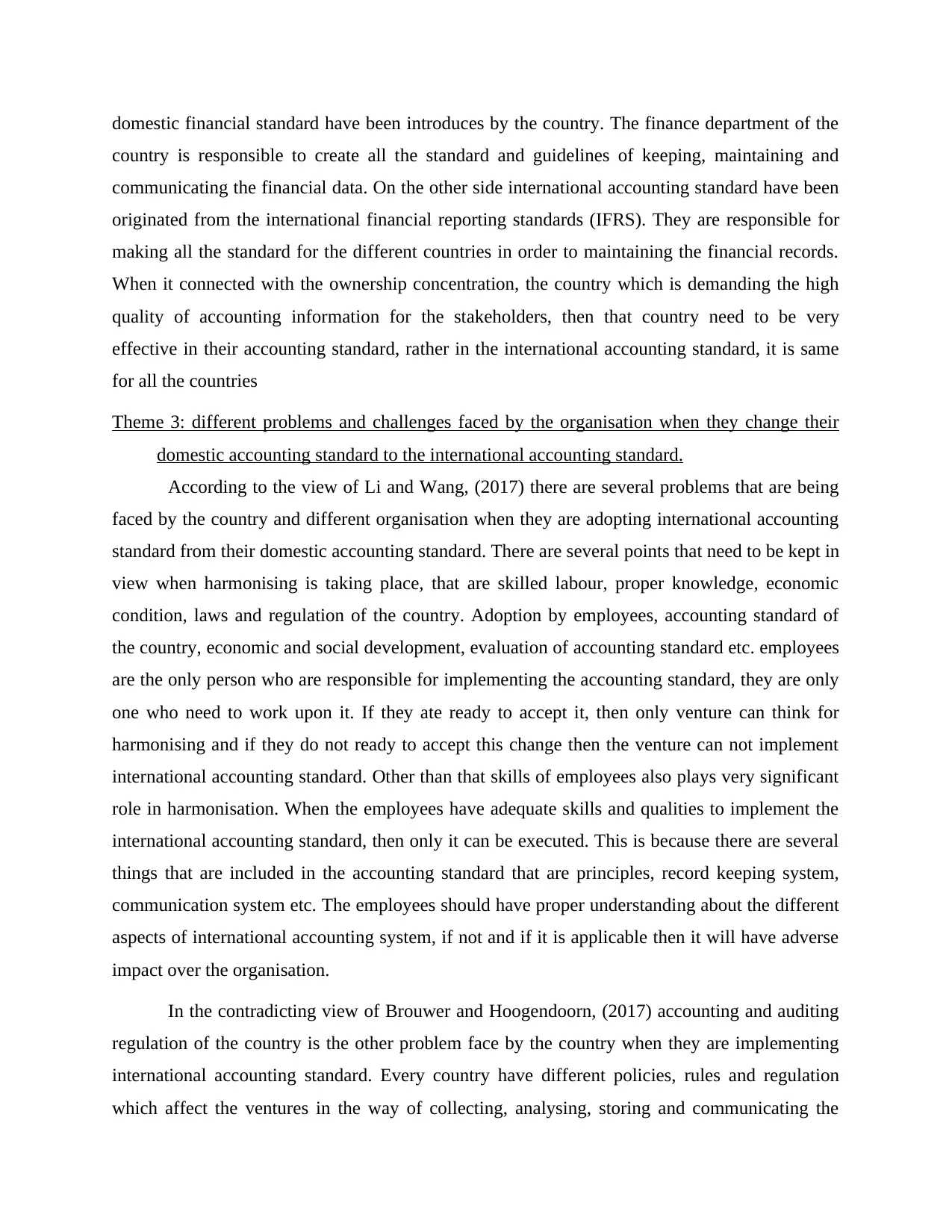
domestic financial standard have been introduces by the country. The finance department of the
country is responsible to create all the standard and guidelines of keeping, maintaining and
communicating the financial data. On the other side international accounting standard have been
originated from the international financial reporting standards (IFRS). They are responsible for
making all the standard for the different countries in order to maintaining the financial records.
When it connected with the ownership concentration, the country which is demanding the high
quality of accounting information for the stakeholders, then that country need to be very
effective in their accounting standard, rather in the international accounting standard, it is same
for all the countries
Theme 3: different problems and challenges faced by the organisation when they change their
domestic accounting standard to the international accounting standard.
According to the view of Li and Wang, (2017) there are several problems that are being
faced by the country and different organisation when they are adopting international accounting
standard from their domestic accounting standard. There are several points that need to be kept in
view when harmonising is taking place, that are skilled labour, proper knowledge, economic
condition, laws and regulation of the country. Adoption by employees, accounting standard of
the country, economic and social development, evaluation of accounting standard etc. employees
are the only person who are responsible for implementing the accounting standard, they are only
one who need to work upon it. If they ate ready to accept it, then only venture can think for
harmonising and if they do not ready to accept this change then the venture can not implement
international accounting standard. Other than that skills of employees also plays very significant
role in harmonisation. When the employees have adequate skills and qualities to implement the
international accounting standard, then only it can be executed. This is because there are several
things that are included in the accounting standard that are principles, record keeping system,
communication system etc. The employees should have proper understanding about the different
aspects of international accounting system, if not and if it is applicable then it will have adverse
impact over the organisation.
In the contradicting view of Brouwer and Hoogendoorn, (2017) accounting and auditing
regulation of the country is the other problem face by the country when they are implementing
international accounting standard. Every country have different policies, rules and regulation
which affect the ventures in the way of collecting, analysing, storing and communicating the
country is responsible to create all the standard and guidelines of keeping, maintaining and
communicating the financial data. On the other side international accounting standard have been
originated from the international financial reporting standards (IFRS). They are responsible for
making all the standard for the different countries in order to maintaining the financial records.
When it connected with the ownership concentration, the country which is demanding the high
quality of accounting information for the stakeholders, then that country need to be very
effective in their accounting standard, rather in the international accounting standard, it is same
for all the countries
Theme 3: different problems and challenges faced by the organisation when they change their
domestic accounting standard to the international accounting standard.
According to the view of Li and Wang, (2017) there are several problems that are being
faced by the country and different organisation when they are adopting international accounting
standard from their domestic accounting standard. There are several points that need to be kept in
view when harmonising is taking place, that are skilled labour, proper knowledge, economic
condition, laws and regulation of the country. Adoption by employees, accounting standard of
the country, economic and social development, evaluation of accounting standard etc. employees
are the only person who are responsible for implementing the accounting standard, they are only
one who need to work upon it. If they ate ready to accept it, then only venture can think for
harmonising and if they do not ready to accept this change then the venture can not implement
international accounting standard. Other than that skills of employees also plays very significant
role in harmonisation. When the employees have adequate skills and qualities to implement the
international accounting standard, then only it can be executed. This is because there are several
things that are included in the accounting standard that are principles, record keeping system,
communication system etc. The employees should have proper understanding about the different
aspects of international accounting system, if not and if it is applicable then it will have adverse
impact over the organisation.
In the contradicting view of Brouwer and Hoogendoorn, (2017) accounting and auditing
regulation of the country is the other problem face by the country when they are implementing
international accounting standard. Every country have different policies, rules and regulation
which affect the ventures in the way of collecting, analysing, storing and communicating the
⊘ This is a preview!⊘
Do you want full access?
Subscribe today to unlock all pages.

Trusted by 1+ million students worldwide
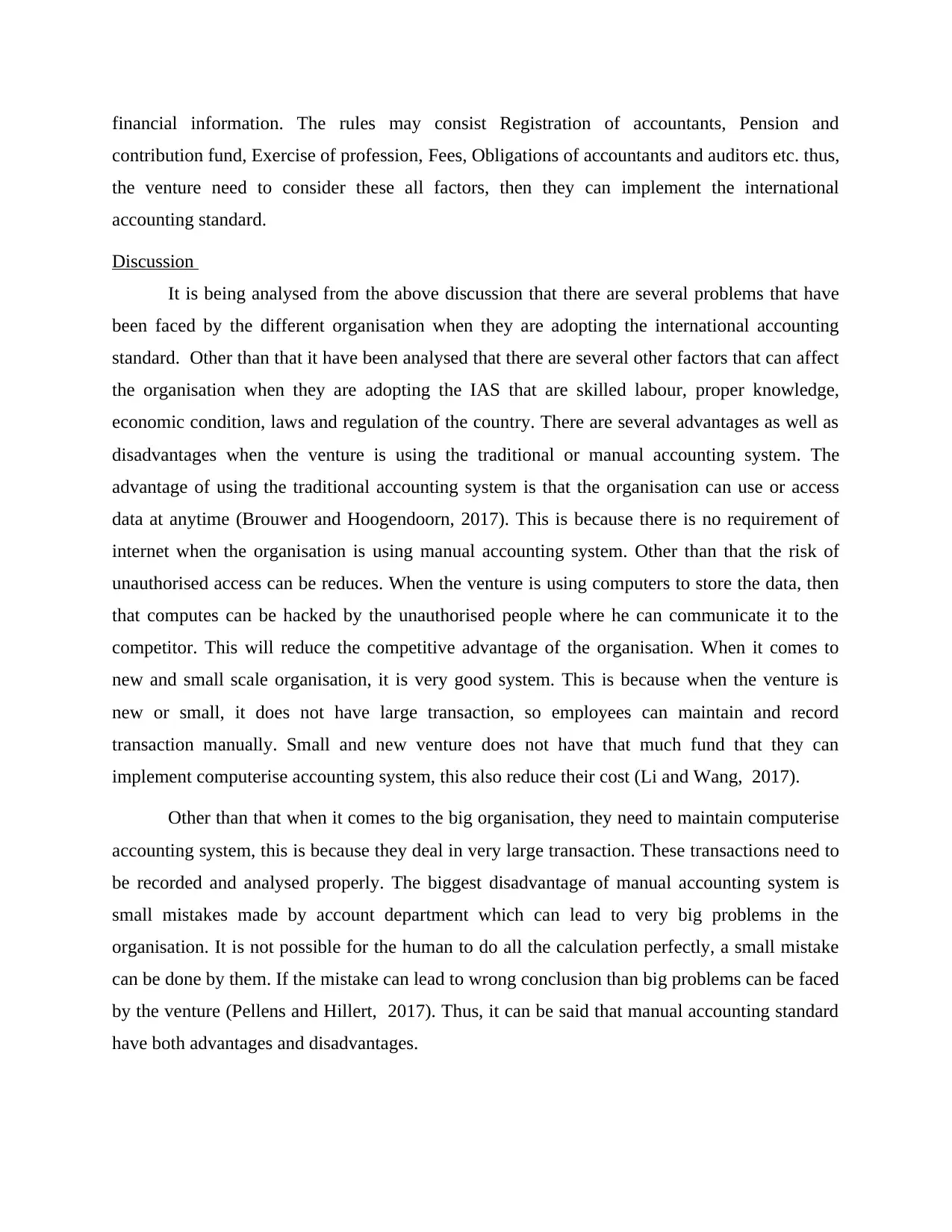
financial information. The rules may consist Registration of accountants, Pension and
contribution fund, Exercise of profession, Fees, Obligations of accountants and auditors etc. thus,
the venture need to consider these all factors, then they can implement the international
accounting standard.
Discussion
It is being analysed from the above discussion that there are several problems that have
been faced by the different organisation when they are adopting the international accounting
standard. Other than that it have been analysed that there are several other factors that can affect
the organisation when they are adopting the IAS that are skilled labour, proper knowledge,
economic condition, laws and regulation of the country. There are several advantages as well as
disadvantages when the venture is using the traditional or manual accounting system. The
advantage of using the traditional accounting system is that the organisation can use or access
data at anytime (Brouwer and Hoogendoorn, 2017). This is because there is no requirement of
internet when the organisation is using manual accounting system. Other than that the risk of
unauthorised access can be reduces. When the venture is using computers to store the data, then
that computes can be hacked by the unauthorised people where he can communicate it to the
competitor. This will reduce the competitive advantage of the organisation. When it comes to
new and small scale organisation, it is very good system. This is because when the venture is
new or small, it does not have large transaction, so employees can maintain and record
transaction manually. Small and new venture does not have that much fund that they can
implement computerise accounting system, this also reduce their cost (Li and Wang, 2017).
Other than that when it comes to the big organisation, they need to maintain computerise
accounting system, this is because they deal in very large transaction. These transactions need to
be recorded and analysed properly. The biggest disadvantage of manual accounting system is
small mistakes made by account department which can lead to very big problems in the
organisation. It is not possible for the human to do all the calculation perfectly, a small mistake
can be done by them. If the mistake can lead to wrong conclusion than big problems can be faced
by the venture (Pellens and Hillert, 2017). Thus, it can be said that manual accounting standard
have both advantages and disadvantages.
contribution fund, Exercise of profession, Fees, Obligations of accountants and auditors etc. thus,
the venture need to consider these all factors, then they can implement the international
accounting standard.
Discussion
It is being analysed from the above discussion that there are several problems that have
been faced by the different organisation when they are adopting the international accounting
standard. Other than that it have been analysed that there are several other factors that can affect
the organisation when they are adopting the IAS that are skilled labour, proper knowledge,
economic condition, laws and regulation of the country. There are several advantages as well as
disadvantages when the venture is using the traditional or manual accounting system. The
advantage of using the traditional accounting system is that the organisation can use or access
data at anytime (Brouwer and Hoogendoorn, 2017). This is because there is no requirement of
internet when the organisation is using manual accounting system. Other than that the risk of
unauthorised access can be reduces. When the venture is using computers to store the data, then
that computes can be hacked by the unauthorised people where he can communicate it to the
competitor. This will reduce the competitive advantage of the organisation. When it comes to
new and small scale organisation, it is very good system. This is because when the venture is
new or small, it does not have large transaction, so employees can maintain and record
transaction manually. Small and new venture does not have that much fund that they can
implement computerise accounting system, this also reduce their cost (Li and Wang, 2017).
Other than that when it comes to the big organisation, they need to maintain computerise
accounting system, this is because they deal in very large transaction. These transactions need to
be recorded and analysed properly. The biggest disadvantage of manual accounting system is
small mistakes made by account department which can lead to very big problems in the
organisation. It is not possible for the human to do all the calculation perfectly, a small mistake
can be done by them. If the mistake can lead to wrong conclusion than big problems can be faced
by the venture (Pellens and Hillert, 2017). Thus, it can be said that manual accounting standard
have both advantages and disadvantages.
Paraphrase This Document
Need a fresh take? Get an instant paraphrase of this document with our AI Paraphraser
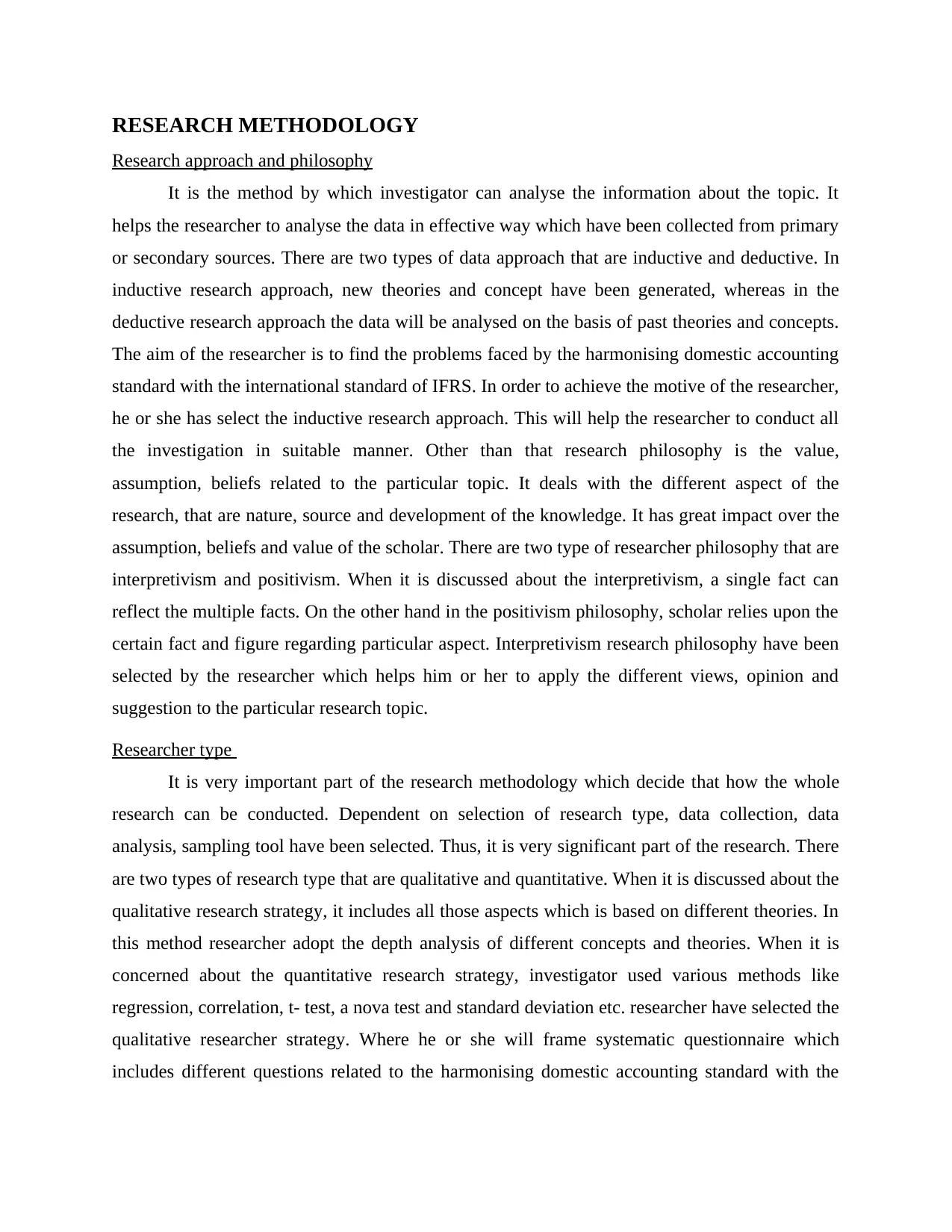
RESEARCH METHODOLOGY
Research approach and philosophy
It is the method by which investigator can analyse the information about the topic. It
helps the researcher to analyse the data in effective way which have been collected from primary
or secondary sources. There are two types of data approach that are inductive and deductive. In
inductive research approach, new theories and concept have been generated, whereas in the
deductive research approach the data will be analysed on the basis of past theories and concepts.
The aim of the researcher is to find the problems faced by the harmonising domestic accounting
standard with the international standard of IFRS. In order to achieve the motive of the researcher,
he or she has select the inductive research approach. This will help the researcher to conduct all
the investigation in suitable manner. Other than that research philosophy is the value,
assumption, beliefs related to the particular topic. It deals with the different aspect of the
research, that are nature, source and development of the knowledge. It has great impact over the
assumption, beliefs and value of the scholar. There are two type of researcher philosophy that are
interpretivism and positivism. When it is discussed about the interpretivism, a single fact can
reflect the multiple facts. On the other hand in the positivism philosophy, scholar relies upon the
certain fact and figure regarding particular aspect. Interpretivism research philosophy have been
selected by the researcher which helps him or her to apply the different views, opinion and
suggestion to the particular research topic.
Researcher type
It is very important part of the research methodology which decide that how the whole
research can be conducted. Dependent on selection of research type, data collection, data
analysis, sampling tool have been selected. Thus, it is very significant part of the research. There
are two types of research type that are qualitative and quantitative. When it is discussed about the
qualitative research strategy, it includes all those aspects which is based on different theories. In
this method researcher adopt the depth analysis of different concepts and theories. When it is
concerned about the quantitative research strategy, investigator used various methods like
regression, correlation, t- test, a nova test and standard deviation etc. researcher have selected the
qualitative researcher strategy. Where he or she will frame systematic questionnaire which
includes different questions related to the harmonising domestic accounting standard with the
Research approach and philosophy
It is the method by which investigator can analyse the information about the topic. It
helps the researcher to analyse the data in effective way which have been collected from primary
or secondary sources. There are two types of data approach that are inductive and deductive. In
inductive research approach, new theories and concept have been generated, whereas in the
deductive research approach the data will be analysed on the basis of past theories and concepts.
The aim of the researcher is to find the problems faced by the harmonising domestic accounting
standard with the international standard of IFRS. In order to achieve the motive of the researcher,
he or she has select the inductive research approach. This will help the researcher to conduct all
the investigation in suitable manner. Other than that research philosophy is the value,
assumption, beliefs related to the particular topic. It deals with the different aspect of the
research, that are nature, source and development of the knowledge. It has great impact over the
assumption, beliefs and value of the scholar. There are two type of researcher philosophy that are
interpretivism and positivism. When it is discussed about the interpretivism, a single fact can
reflect the multiple facts. On the other hand in the positivism philosophy, scholar relies upon the
certain fact and figure regarding particular aspect. Interpretivism research philosophy have been
selected by the researcher which helps him or her to apply the different views, opinion and
suggestion to the particular research topic.
Researcher type
It is very important part of the research methodology which decide that how the whole
research can be conducted. Dependent on selection of research type, data collection, data
analysis, sampling tool have been selected. Thus, it is very significant part of the research. There
are two types of research type that are qualitative and quantitative. When it is discussed about the
qualitative research strategy, it includes all those aspects which is based on different theories. In
this method researcher adopt the depth analysis of different concepts and theories. When it is
concerned about the quantitative research strategy, investigator used various methods like
regression, correlation, t- test, a nova test and standard deviation etc. researcher have selected the
qualitative researcher strategy. Where he or she will frame systematic questionnaire which
includes different questions related to the harmonising domestic accounting standard with the
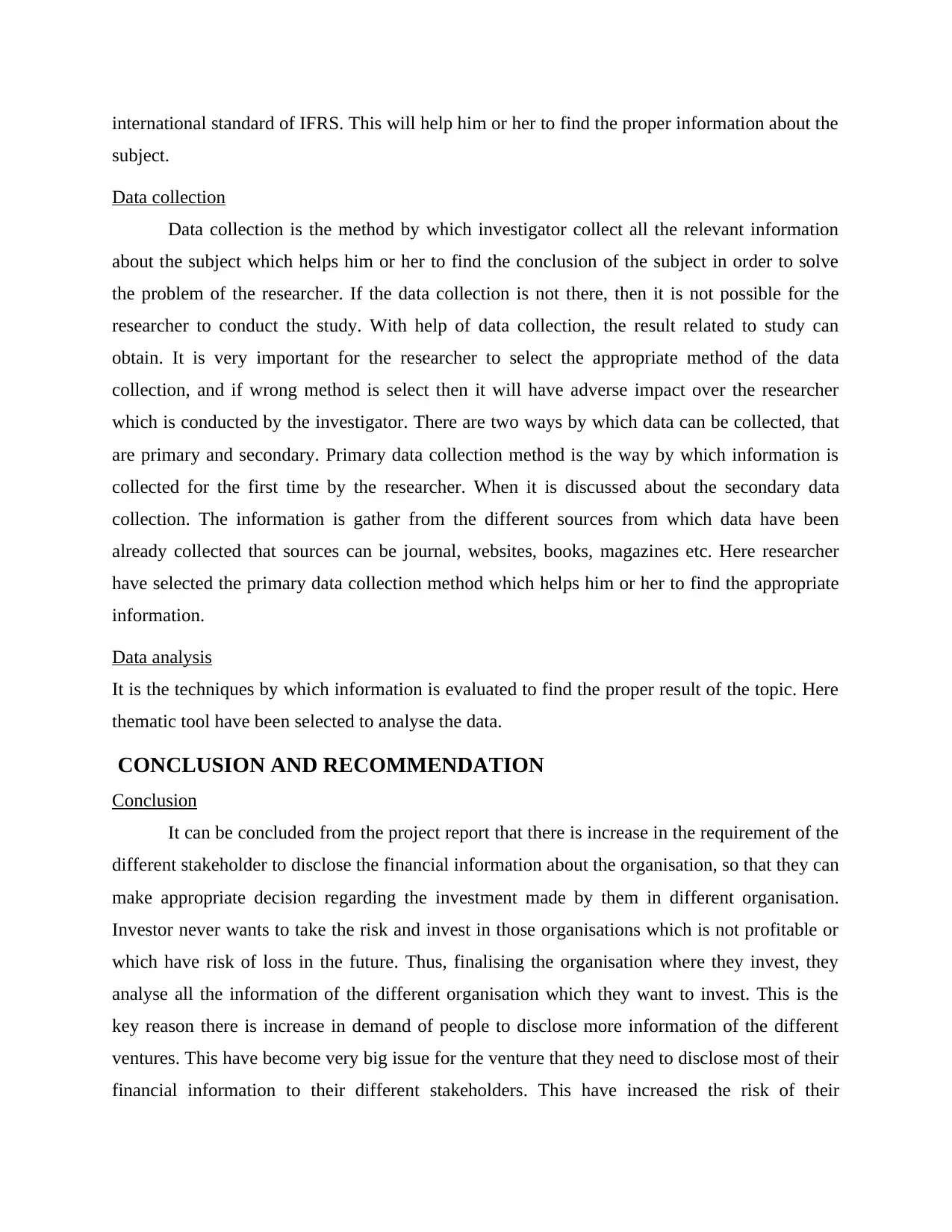
international standard of IFRS. This will help him or her to find the proper information about the
subject.
Data collection
Data collection is the method by which investigator collect all the relevant information
about the subject which helps him or her to find the conclusion of the subject in order to solve
the problem of the researcher. If the data collection is not there, then it is not possible for the
researcher to conduct the study. With help of data collection, the result related to study can
obtain. It is very important for the researcher to select the appropriate method of the data
collection, and if wrong method is select then it will have adverse impact over the researcher
which is conducted by the investigator. There are two ways by which data can be collected, that
are primary and secondary. Primary data collection method is the way by which information is
collected for the first time by the researcher. When it is discussed about the secondary data
collection. The information is gather from the different sources from which data have been
already collected that sources can be journal, websites, books, magazines etc. Here researcher
have selected the primary data collection method which helps him or her to find the appropriate
information.
Data analysis
It is the techniques by which information is evaluated to find the proper result of the topic. Here
thematic tool have been selected to analyse the data.
CONCLUSION AND RECOMMENDATION
Conclusion
It can be concluded from the project report that there is increase in the requirement of the
different stakeholder to disclose the financial information about the organisation, so that they can
make appropriate decision regarding the investment made by them in different organisation.
Investor never wants to take the risk and invest in those organisations which is not profitable or
which have risk of loss in the future. Thus, finalising the organisation where they invest, they
analyse all the information of the different organisation which they want to invest. This is the
key reason there is increase in demand of people to disclose more information of the different
ventures. This have become very big issue for the venture that they need to disclose most of their
financial information to their different stakeholders. This have increased the risk of their
subject.
Data collection
Data collection is the method by which investigator collect all the relevant information
about the subject which helps him or her to find the conclusion of the subject in order to solve
the problem of the researcher. If the data collection is not there, then it is not possible for the
researcher to conduct the study. With help of data collection, the result related to study can
obtain. It is very important for the researcher to select the appropriate method of the data
collection, and if wrong method is select then it will have adverse impact over the researcher
which is conducted by the investigator. There are two ways by which data can be collected, that
are primary and secondary. Primary data collection method is the way by which information is
collected for the first time by the researcher. When it is discussed about the secondary data
collection. The information is gather from the different sources from which data have been
already collected that sources can be journal, websites, books, magazines etc. Here researcher
have selected the primary data collection method which helps him or her to find the appropriate
information.
Data analysis
It is the techniques by which information is evaluated to find the proper result of the topic. Here
thematic tool have been selected to analyse the data.
CONCLUSION AND RECOMMENDATION
Conclusion
It can be concluded from the project report that there is increase in the requirement of the
different stakeholder to disclose the financial information about the organisation, so that they can
make appropriate decision regarding the investment made by them in different organisation.
Investor never wants to take the risk and invest in those organisations which is not profitable or
which have risk of loss in the future. Thus, finalising the organisation where they invest, they
analyse all the information of the different organisation which they want to invest. This is the
key reason there is increase in demand of people to disclose more information of the different
ventures. This have become very big issue for the venture that they need to disclose most of their
financial information to their different stakeholders. This have increased the risk of their
⊘ This is a preview!⊘
Do you want full access?
Subscribe today to unlock all pages.

Trusted by 1+ million students worldwide
1 out of 16
Related Documents
Your All-in-One AI-Powered Toolkit for Academic Success.
+13062052269
info@desklib.com
Available 24*7 on WhatsApp / Email
![[object Object]](/_next/static/media/star-bottom.7253800d.svg)
Unlock your academic potential
Copyright © 2020–2026 A2Z Services. All Rights Reserved. Developed and managed by ZUCOL.





